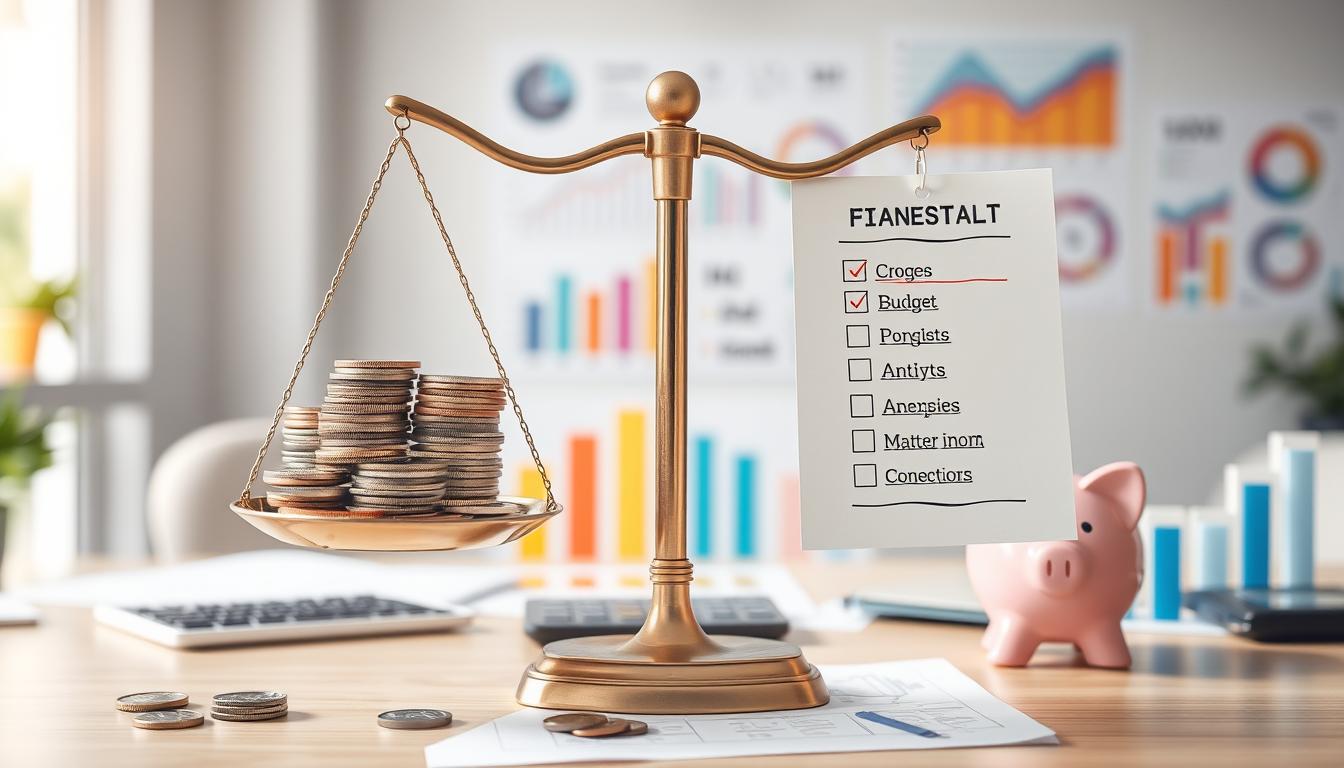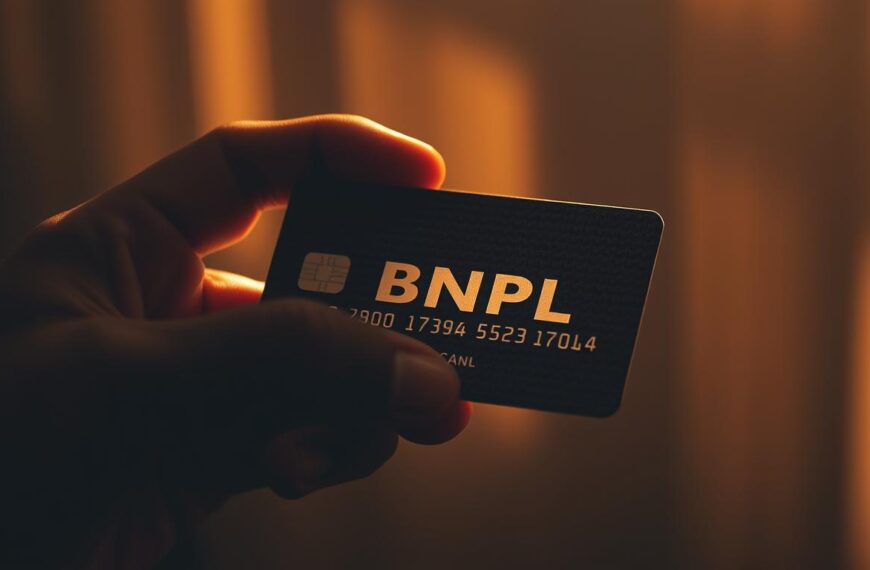Smart budget management empowers people to control their finances. Many households face financial pressure due to rising costs. These include rent, mortgages, food, energy bills, and petrol1.
Effective money management is about wise resource allocation. Households could save £3,000 to £5,000 yearly by using strategic budgeting techniques1.
Financial planning starts with knowing your spending habits. Experts suggest reviewing recent bank statements to spot key trends. This helps identify areas for improvement2.
Understanding your monthly income and spending is vital for solid budget management. Tracking expenses accurately prevents financial pitfalls. Inaccurate estimates can lead to underestimating costs and potential debt1.
Gather at least three months of bank statements and receipts. This gives you a clear view of your financial situation1.
Successful budgeting isn’t about perfection. It’s about staying aware and planning wisely. Small changes can lead to big financial improvements over time.
Understanding the Fundamentals of Budgeting
Budgeting basics are vital for personal finance success. A budget acts as a financial guide, helping track income and manage expenses. It’s a crucial tool for achieving financial goals with strategic precision.
Effective financial management hinges on creating and maintaining a robust budget. This process provides clear insights into your financial health. It’s the foundation for making informed decisions about your money.
What Makes a Budget Essential
Budgeting is key to financial stability and goal achievement. Organisations tracking budget variances can improve their financial objectives by 25%3. This process allows for income tracking and expense categorisation.
Key Components of a Successful Budget
- Detailed income documentation
- Comprehensive expense tracking
- Regular financial review
- Flexible allocation strategies
A robust budget framework includes multiple components:
| Budget Type | Primary Focus |
|---|---|
| Operating Budget | Revenue and expense categories |
| Capital Budget | Major purchases and investments |
| Cash Budget | Cash flow timing and management |
Setting Realistic Financial Goals
Clear financial goals are crucial for budgeting success. Personal budgeters using zero-based budgeting can increase savings by up to 30%3. Your targets should be measurable and time-based.
Align your goals with your broader financial vision4. This approach ensures your budget supports both short-term needs and long-term aspirations.
“A goal without a plan is just a wish” – Financial Planning Wisdom
Grasping these budgeting basics will help you create a solid financial strategy. You’ll be better equipped to manage your money and reach your financial targets.
Creating Your Personal Budget Framework

Crafting a personal budget is key to effective financial planning. It starts with assessing your income, helping you control your financial future5. Many find budgeting tough, with half feeling overwhelmed managing finances without structure5.
Let’s break down the essential steps for budget creation:
- Identify Total Income
- Compile earnings from all sources
- Calculate monthly net income
- Expense Tracking
- Categorise fixed and variable expenses
- Analyse spending patterns
- Budget Allocation Strategy
Financial experts suggest this budget allocation approach:
| Category | Percentage | Purpose |
|---|---|---|
| Essentials (Needs) | 50% | Housing, Food, Utilities |
| Wants | 30% | Entertainment, Dining Out |
| Savings/Debt Repayment | 20% | Emergency Fund, Investments |
For better expense tracking, try digital financial planning tools. About 70% of consumers find budgeting apps help them stay within spending limits5. Review your budget every 3-6 months to improve your financial strategy5.
“A budget is telling your money where to go instead of wondering where it went.” – Dave Ramsey
Using these strategies will change how you handle personal finance. You’ll find budget creation empowering rather than daunting6.
Budget Management Tips for Long-term Success
Smart strategies and planning are key to financial stability. Robust budget allocation techniques can transform your finances and help achieve long-term goals7.
Financial success isn’t about restricting spending, but making intelligent choices. The 50/30/20 rule provides an excellent framework for budget management.
This rule suggests allocating your income as follows:
- 50% for essential expenses
- 30% for discretionary spending
- 20% dedicated to savings strategies
Smart Money Allocation Strategies
Effective budget allocation begins with understanding your financial landscape. Track your income and expenses meticulously to create a personalised budget8.
Digital Tools and Apps for Budget Tracking
Modern financial apps have revolutionised budget management. These tools offer real-time insights into spending patterns, helping you make informed decisions7.
Building Emergency Savings
An emergency fund is crucial for financial resilience. Experts recommend saving six months’ worth of expenses for unexpected situations8.
| Savings Goal | Monthly Contribution | Time to Achieve |
|---|---|---|
| £3,000 Emergency Fund | £250 | 12 months |
| £6,000 Emergency Fund | £500 | 12 months |
“The secret of getting ahead is getting started” – Mark Twain
Successful budget management is a continuous journey of learning and adapting. Stay committed, track your progress, and adjust your strategies as your finances change7.
Practical Ways to Stay Within Your Budget
Strategic planning and disciplined money management are key to sticking to your budget. Budgeting tools can help you tackle financial challenges effectively9.
Cost-cutting strategies are vital for successful financial planning. Over 70% of people who budget feel more in control of their finances9. Here are some practical approaches to consider:
- Negotiate utility bills to reduce monthly expenses9
- Cut leisure spending by 20% to free up significant funds9
- Explore online cashback services for additional savings9
Debt management is crucial for financial stability. The average credit card debt per borrower in the UK is £7,23610. Smart debt reduction strategies are essential to tackle this issue.
| Budget Strategy | Potential Savings |
|---|---|
| Meal Planning | Up to 25% reduction in grocery bills11 |
| Online Grocery Shopping | 10-15% decreased spending11 |
| No-Spend Challenges | Average £500 monthly savings11 |
Boosting your income can support your budgeting efforts. Freelancers might earn between £20 to £50 per hour, depending on their skills9. Saving £50 per paycheck can add up to £1,300 annually11.
Remember, individuals who budget are 30% more likely to achieve their financial goals11.
By using these strategies, you can improve your finances and create a strong, lasting budget. Your financial future can be transformed with consistent effort and smart choices.
Conclusion
Mastering budget management transforms your long-term financial planning. Strategic approaches like tracking spending and setting clear goals can improve your economic landscape. Regular budget reviews enable informed decisions and proactive financial strategies.
Digital tools and automated savings methods boost budgeting effectiveness. Research shows automated savings can increase savings rates by up to 30%12. Monitoring expenses and maintaining an emergency fund creates a robust financial safety net.
Financial success isn’t about perfection. It’s about persistent learning and adaptation. Budgeting provides clarity, control, and confidence in your financial journey.
With patience and commitment, you’ll develop valuable money skills. These skills can open doors to greater financial freedom. They also bring peace of mind to your financial life.
FAQ
What exactly is a budget and why do I need one?
A budget is a financial plan that tracks income and expenses. It gives you a clear picture of your financial health. This roadmap guides your money management, helping you make informed decisions and reduce stress.
How do I start creating a budget if I’ve never done it before?
Start by tracking all income sources and listing every expense for a month. Categorise your spending into fixed costs (rent, utilities) and variable expenses (entertainment, dining out).
Use a spreadsheet or budgeting app to organise the information. Calculate the difference between income and expenses. Identify areas where you can cut back or save more.
What’s the best budgeting method for someone just starting out?
The 50/30/20 rule is excellent for beginners. Allocate 50% of income to needs, 30% to wants, and 20% to savings. This approach provides a simple framework for managing money while allowing spending flexibility.
How can I stick to my budget when unexpected expenses arise?
Build an emergency fund as a financial safety net. Save small amounts regularly, aiming for 3-6 months of living expenses. This buffer helps with unexpected costs without derailing your entire budget.
Regularly review and adjust your budget to accommodate changing circumstances. This keeps your financial plan relevant and effective.
What are some effective ways to reduce expenses without feeling deprived?
Try negotiating bills, using cashback apps, and buying generic brands. Find free or low-cost entertainment options. Meal planning, using public transport, and attending free community events can help save money.
How often should I review and update my budget?
Review your budget monthly. Track spending, compare it against your plan, and make necessary adjustments. Major life changes may require more frequent updates.
What digital tools can help me manage my budget more effectively?
Budgeting apps like Monzo, YNAB, and Starling Bank offer real-time tracking and financial insights. Many banks provide built-in budgeting features in their mobile apps. Choose a tool that matches your tech comfort level.
How can I boost my income to improve my budgeting?
Consider side hustles like freelancing, tutoring, or selling items online. Increase your skills and negotiate a raise at work. Explore passive income streams such as investing or creating digital content.
Always ensure any additional income is strategically integrated into your budget. This helps maximise the benefits of your extra earnings.

















